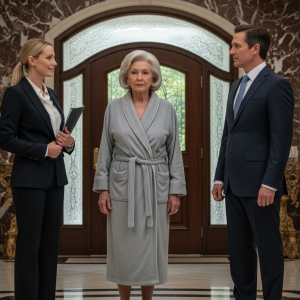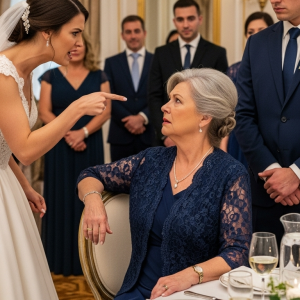I never thought a quiet Tuesday dinner—meatloaf, overcooked peas, the usual—would end with my son announcing my exile. Derek leaned back in his chair, a smug look on his face as if he’d just closed a major deal. “We’re moving in next month,” he said, nodding toward the kitchen. “Finally, this place will get some real use.”
His wife, Jenna, laughed without looking up from her phone. “It’s about time. This whole house wasted on one old lady. It’s ridiculous.” I set my fork down carefully, my hand trembling not from age, but from the pure, cold shock of it. This wasn’t a joke. They meant it.
Jenna kicked her heels off, her painted toes tapping on the hardwood floor I’d refinished myself. “I mean, seriously,” she went on, as if I were a ghost at my own table. “She’s got three guest rooms and an attic full of junk. We’ll turn that into a nursery and an office. Easy.”
Derek grinned at her, then turned his empty smile on me. “Yeah, Mom’s finally starting to accept it, right, Ma? Downsizing and all that.” There was no warmth in his voice, just the chilling sound of assumption. Of entitlement. They had stopped seeing me as a person years ago. To them, I was a place, a bank account, a stepping stone.
Jenna’s sugary, smug smile was the final blow. “Don’t worry, we’ll keep your room just how you like it.” My room. In my own house. That was the moment something inside me didn’t just break; it locked shut, solid and final. I smiled back, a stranger in my own skin, and reached for my water glass. They had no idea. This house wasn’t mine to give anymore.
Three weeks earlier, I had stood on the courthouse steps, the ink still drying on the documents that severed me from this life. I had just finalized the sale of the house. It was quiet, legal, and deliberate. No tears, no ceremony, just a calm signature and a handshake with the young couple who would take my place.
Sam and Alicia, newlyweds from church, were expecting their first child. They reminded me of who I used to be, before my life became a series of obligations to people who felt none toward me. Derek and Jenna hadn’t even noticed the ‘For Sale’ sign was missing from the yard when they arrived. They never noticed anything that wasn’t for their own benefit.
For six years, I had been their backup plan: a babysitter, a walking checkbook, a silent benefactor. Jenna once said to a neighbor, loud enough for me to hear, “Honestly, she’s just keeping the house warm until we’re ready.” I pretended not to hear. That was always my mistake. Letting them think silence meant agreement. But I was not silent when I signed that contract.
The real shift came six months ago. Derek called me late, his voice casual. “Hey Ma, just wondering, did you ever file those Power of Attorney papers we talked about?” We had never talked about that. Not once.
“What are you talking about?” I asked, my blood running cold.

He chuckled. “You know, just in case something happens. I figured it’d be easier if I was already on your accounts. You’re not getting any younger.” That was the moment I knew. He wasn’t just waiting for me to fade away; he was actively planning for it.
Every comment about my memory, every joke about me being tired, every eye-roll when I turned off lights to save money—it was all a test. He was building a narrative, seeing how far he could push before I broke. But I didn’t break. I noticed everything. That night, I opened the folder I’d been quietly building for two years. Its label was simple: Exit Plan.
By the time Derek called about that paperwork, I was already gone in every way that mattered. Six months earlier, I’d signed the sale agreement with Sam and Alicia. I hadn’t listed the house publicly. “I just want it in the hands of someone who will love it,” I’d told them over coffee.
The papers were filed quietly with Mr. Carter, the real estate lawyer I’d used for decades. No drama, no signs, just silent, legal progress. I began giving things away, piece by piece. My wedding china, my husband Gary’s old tools. I kept only what mattered: my books, my photos, my dignity.
I sold the house not just to cut them off, but to choose myself. I didn’t want four empty bedrooms and a lifetime of yard work. I wanted peace. I wanted a place no one could barge into and claim as their own. So I bought it: a two-bedroom condo across from the library, with an elevator and a small balcony just big enough for a chair and a geranium. They thought I was staying because I had nowhere else to go. They were wrong. I was staying just long enough to leave on my own terms.
The morning after the sale closed, I drove to the condo alone. I parked in my assigned spot and looked up at my new home: a simple second-floor unit with a screened-in balcony. No stairs to fall down. No ungrateful children to manage. I hadn’t just sold my old house; I’d bought this new one outright. No mortgage, no repairs waiting to ambush me.
Inside, it smelled of fresh paint. Sunlight streamed into every room. It was silent, but it was the kind of silence that made you breathe deeper, not hold your breath. I ran my hand along the smooth quartz countertop. This place wasn’t a downgrade. It was a liberation.
I met with my lawyer, Mr. Carter, two weeks before that fateful dinner. He was a man of three-piece suits and quiet authority. “The sale is locked, funds cleared, condo secured,” he confirmed, sliding a folder across his desk. “I also took the liberty of drawing up a cease and desist clause for unauthorized occupancy. Just in case.”
He then told me something that solidified my resolve. “I’ve had three calls from your son in the past six months,” he said, his expression grim. “Asking about your will, your power of attorney, and a meeting to ‘manage your financial affairs.’ He’s not just curious, Mrs. Langley. He’s preparing.” I drove home that day with a new kind of clarity. Derek thought he had a plan, but I had a fortress at my back.
And now, we’re back at the dinner table. Derek leaned back in my chair like he already owned it. “We’re moving in next month,” he said, smug as a cat. Jenna smirked, “Honestly, it’s sad watching this house just stagnate. It needs life.”
I smiled, folding my napkin slowly. I reached for my water and said, my voice clear and calm, “That’s awkward. I already sold the house.”
The sound of Jenna’s fork hitting her plate was sharper than the silence that followed. Derek’s mouth hung open. “You… what?”
“I sold it,” I repeated, my voice even. “Three weeks ago. The deed is no longer in my name. It’s not mine anymore.”
Jenna’s eyes narrowed. “You’re joking. Tell me you’re joking.”
“Why would I joke?” I asked. “You weren’t joking when you made your plans.”
Derek shook his head, as if waking from a dream. “You can’t just sell the house without telling us! That’s… that’s mine!”
“No,” I cut in, my voice soft but firm. “It was mine. And now it isn’t.” For the first time in years, I watched my son realize I wasn’t just his mother. I was a woman with a will of her own.
“You didn’t really sell it,” Derek insisted, his voice rising. “You’re just saying that to punish us!”
I reached down beside my chair and pulled up the folder I’d brought. I placed it gently on the table between the mashed potatoes and his shattered sense of ownership. “I figured you’d say that,” I said calmly. “So, here’s the paperwork. Transfer of title, closing statement, and my new condo lease.”
Jenna yanked the folder open. Her eyes widened as she scanned the pages. “$487,000?” she whispered, her mouth agape. Derek snatched the papers from her. “Who are the buyers?”
“Sam and Alicia Henderson. From church. They move in next month.”
His face twisted with rage. “You had no right to do this behind our backs!”
“You don’t live here,” I said softly. “You never did. You stopped visiting unless something was broken or overdue. This isn’t a family decision because you stopped acting like family.” I looked at both of them, their eyes scanning the proof like it might magically rearrange itself. “You asked for nothing, and you assumed everything.”
Derek’s fist came down hard on the table. “You betrayed us!” he roared, standing to tower over me. “You always said this house would stay in the family!”
“No,” I said quietly. “You assumed it would.”
Jenna’s voice was pure venom. “After everything we’ve done for you, this is how you thank us?”
That’s when something ancient and tired rose up in me. “No,” I said, my voice gaining strength. “After everything I’ve done for you. You treat me like a backup generator, only useful when your own lights go out.” I looked at Jenna. “I paid for your car repair after that accident. And what did you call me the next week? A glorified babysitter with a pension.”
Jenna went pale. I shook my head, my voice calm and clear. “You didn’t lose a home tonight. You lost control.” They stood there, stunned into silence. For the first time in a very long time, I was speaking, and they had absolutely nothing to say.
“You want to talk about betrayal?” I said, my voice steady. “Let’s look at the record.” I pulled another sheet from the folder. It was a list, in my own neat handwriting.
“$12,000 to cover your overdue rent. $18,000 to help you buy the Honda. $20,000 for Jenna’s surgery. Over $50,000 in six years, not counting the favors, the driving, the babysitting.”
Jenna scoffed. “So what? You want us to repay you?”
“No,” I said, folding the list. “I want you to understand that your belief that I owe you anything is a lie you tell yourselves.” I pushed my chair back and stood, slow and steady. “This wasn’t revenge. This was an act of self-preservation.”
Their stunned silence was my answer. The realization was dawning: what they called love had been convenience. What they called care had been calculation. And now the account was closed.
I pulled out one final document—an email from Derek to Mr. Carter, inquiring about my legal and mental state. I slid it across the table. “You weren’t just asking about the house,” I said, my voice dangerously quiet. “You were asking about my power of attorney.”
Jenna’s head jerked toward him. “You were trying to gain control of my legal documents? You asked my lawyer if I had memory issues. You were trying to build a case against me.”
“I was just thinking ahead!” he stammered.
“No,” I said, leaning forward. “You weren’t planning to help me. You were planning to manage me. To corner me until I was too dependent to fight back. That’s why I sold the house. I didn’t run from you. I got ahead of you.” The silence in the room was no longer shock; it was the suffocating weight of exposure.
After they stormed out, a deep, dull grief settled in my chest. How do you mourn someone who is still alive? That’s what it felt like—a death of the family I thought I had. It wasn’t their anger that hurt; it was the fact that they weren’t sorry, just caught.
The fallout was swift. Derek’s small business loan, which he’d applied for assuming he’d have my house as collateral, was denied. Mr. Carter had reported Jenna’s unauthorized attempt to access my accounts, and while no charges were filed, her bank flagged her account and cut her spending limit.
The whisper network in town, which so often shames older women for “causing drama,” turned its focus where it belonged. People stopped offering them sympathy. Instead, they started offering me rides, meals, and invitations. I didn’t throw them under the bus; I simply stepped out of its way and let the world see them for who they were.
I moved into my condo two weeks later. My niece, Emily, had left fresh flowers on the balcony. “Your life belongs to you now,” the note read. “May it bloom.” That first night, I sat in a silence that was filled not with loneliness, but with peace.
A week later, a letter arrived. It was from Derek. Mom, I took you for granted. I thought the house meant security. I didn’t realize how much I expected without giving anything back. I’m sorry.
I read it twice, then folded it carefully and placed it in a drawer. Not to reread, not even to reply. Just to let it be. I didn’t need his apology to move forward. I already had everything I needed: the quiet, the flowers, and the keys to my own life, held firmly in my own hand.




